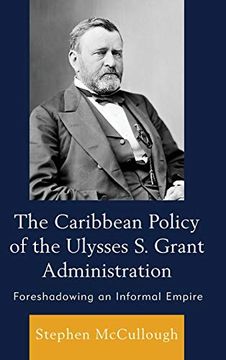Compartir
The Caribbean Policy of the Ulysses s. Grant Administration: Foreshadowing an Informal Empire (en Inglés)
Stephen Mccullough (Autor)
·
Lexington Books
· Tapa Dura
The Caribbean Policy of the Ulysses s. Grant Administration: Foreshadowing an Informal Empire (en Inglés) - Stephen Mccullough
S/ 556,52
S/ 1.113,04
Ahorras: S/ 556,52
Elige la lista en la que quieres agregar tu producto o crea una nueva lista
✓ Producto agregado correctamente a la lista de deseos.
Ir a Mis Listas
Origen: Estados Unidos
(Costos de importación incluídos en el precio)
Se enviará desde nuestra bodega entre el
Lunes 20 de Mayo y el
Lunes 03 de Junio.
Lo recibirás en cualquier lugar de Perú entre 2 y 5 días hábiles luego del envío.
Reseña del libro "The Caribbean Policy of the Ulysses s. Grant Administration: Foreshadowing an Informal Empire (en Inglés)"
From 1869 to 1877, the United States found itself deeply involved in the Caribbean as Washington sought to replace European influence and colonialism with an informal American empire. The Ulysses S. Grant administration primarily dealt with an uprising in Spanish Cuba known as the Ten Years' War that threatened to draw in the United States. The Cuban rebels used the United States as a base of support, causing conflict between Washington and Madrid. Many Americans, including Grant, wanted to replace Spanish rule in Cuba with a U.S. protectorate, but Secretary of State Hamilton Fish opposed American colonial entanglements. President Grant looked to expand U.S. interests in the Caribbean. He looked to acquire colonies to provide naval bases to protect the trade routes to a potential American built and controlled canal in Central America. Fish preferred to expand U.S. commercial interests in the region rather than acquiring colonies. At no time was he prepared to obligate the United States to any long-term commitments. He wanted to end the war in Cuba because it hurt U.S. economic interests. He had no desire to acquire territory, but expected the Caribbean to fall into the U.S. economic sphere. Despite his personal opposition to territorial acquisition in Fish went along with Grant's Dominican annexation project because he foresaw it as a chance to end European imperialism and to gain the president's confidence. The Senate's failure to approve the Dominican annexation only hardened his opposition to the creation of an American empire. He rejected Haitian offers of a naval base within that country, and he continually sought an end to the Cuban rebellion, lest it drag in the United States. Though the administration's many peace initiatives failed, it forestalled Congressional intervention and kept the United States neutral in the conflict.
- 0% (0)
- 0% (0)
- 0% (0)
- 0% (0)
- 0% (0)
Todos los libros de nuestro catálogo son Originales.
El libro está escrito en Inglés.
La encuadernación de esta edición es Tapa Dura.
✓ Producto agregado correctamente al carro, Ir a Pagar.

